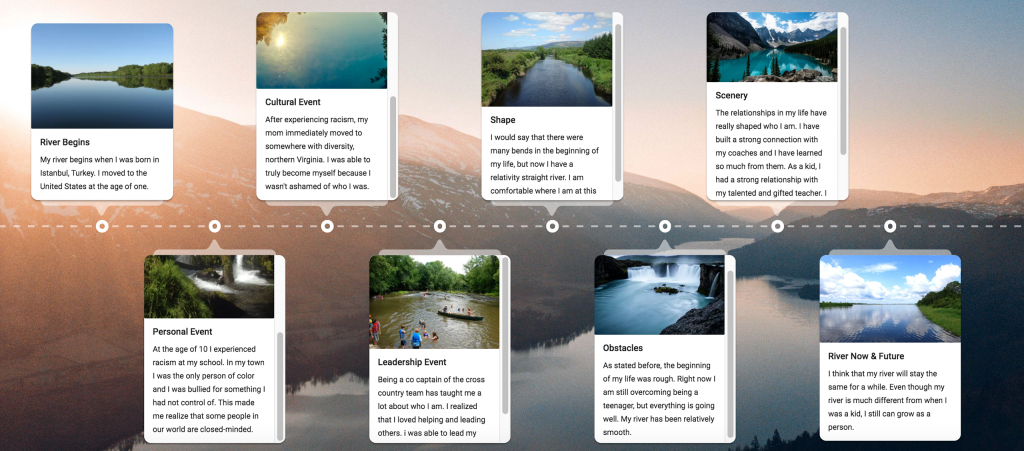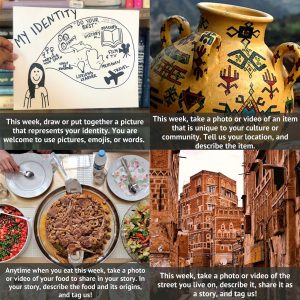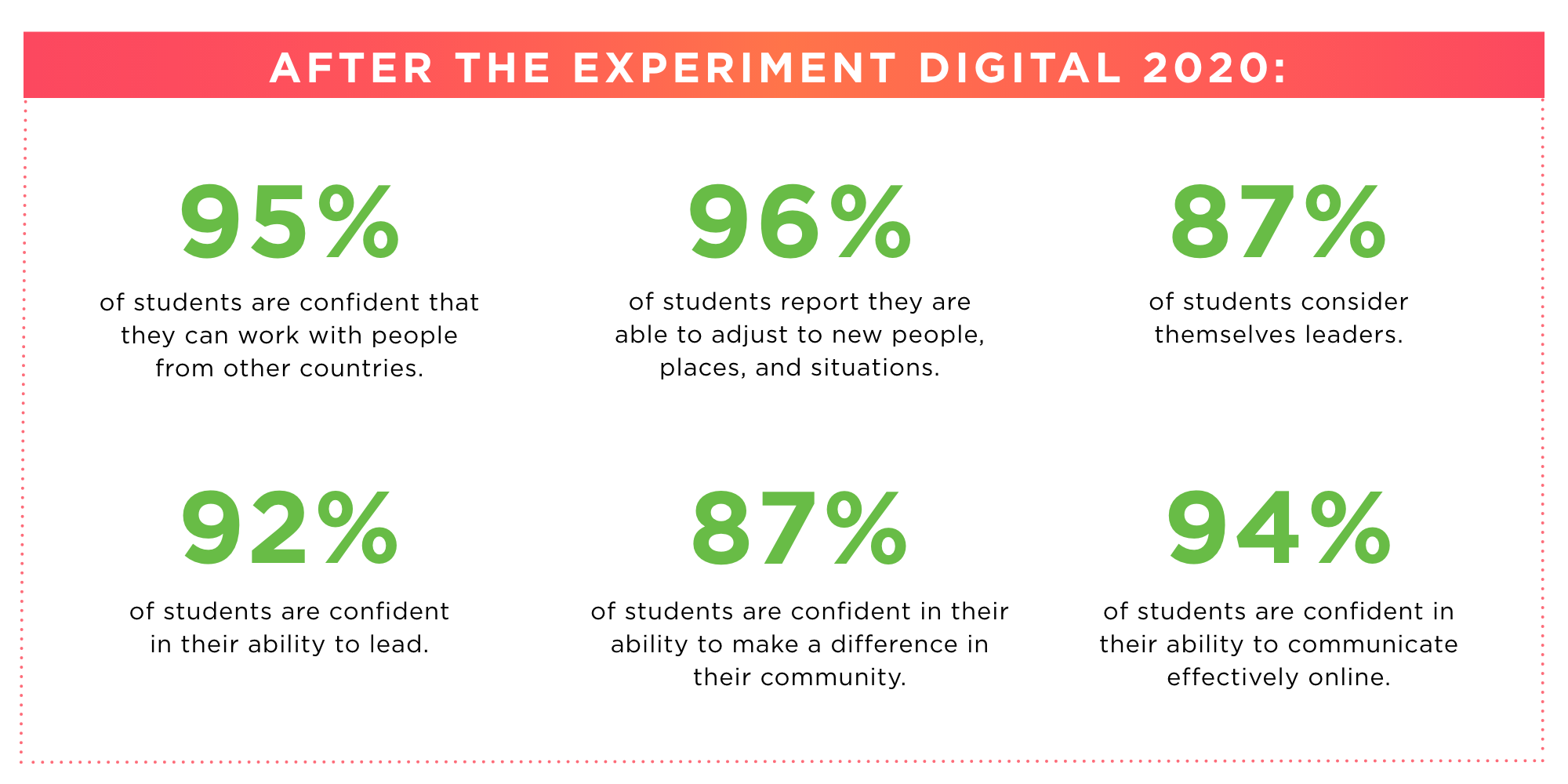In 2016, World Learning launched a virtual exchange program designed to connect students from the Middle East with their U.S. peers. Without leaving their living rooms, participants interacted through videos, discussion forums, webinars, online chats, and playing digital games together.
Known as DYLEP—Digital Young Leaders Exchange Program—it brought together more than 300 youth from different countries and cultures to learn about each other and develop friendships and a common language, advance leadership skills, discuss civic rights and responsibilities, and implement community projects with positive social impact.
At the time, the online format was created to expand access to intercultural leadership programs for students who were not able to travel due to politics, gender restrictions, visa issues, or limited financial resources. Only four years later, what started as a pioneering project of The Experiment in International Living—World Learning’s 88-year-old flagship program—has scaled up faster than anyone imagined.
“Expanding digital programming was always a long-term goal of ours but COVID-19 sped up our timetable,” says Christina Thomas, divisional vice president of Youth Exchange. The concept aligned well with the program’s tradition of providing access to diverse socio-economic backgrounds.
“In a matter of weeks, the majority of our team, who normally would be facilitating in person activities and exchanges in front of hundreds of students, became instructional designers almost overnight,” she says. Today, the digital program is a critical outlet for global intercultural exchange in a time of crisis.
Rebranded The Experiment Digital, this fully-funded virtual youth exchange provided students this summer with a completely safe, accessible, and dynamic experience in the midst of the COVID-19 worldwide pandemic.
In summer 2020, a total of 922 high schoolers from around the world completed The Experiment Digital, and 325 more students participated in other youth exchange programs, such as the Youth Ambassadors Program, Jóvenes en Acción, and IYLEP (Iraqi Young Leaders Exchange Program), facilitated by World Learning.
Leadership & Teamwork Activities, Bring Students Together
The Experiment Digital is based on many decades of Experiment programming that developed best practices in experiential learning. Activities center around bringing students together to navigate scenarios that test their abilities and reflect on lessons learned through collaborative dialogue.
One of the interactive activities students work on is the River of Life. The activity invites students to think about their own life as a river, a unique path that leads to who they are and where they are headed.

River of Life activity prompt
They reflect on the significant events, people, activities that have shaped the course of their life. Each student can view their peers’ rivers and connect through comments to discuss their similarities and ask each other questions.

In another activity, the sinking boat exercise, participants work in small groups to decide which three items they should keep on their sinking boat in order to survive for two days. The icebreaker is not only fun but helps students understand the importance of working together. Maryam, a 2020 participant, says she learned from participating in the exercise that, “We should be a team for better results.” Lily, another participant this summer agrees and adds: “Compromise and listening to other people’s ideas is incredibly important.”
In addition to their assigned activities, participants choose to “Instashare,” posting small slices of their lives on Instagram. The Experiment Digital provides prompts that allow students to compare and connect with peers about everything from their favorite local stores to hobbies and family traditions.

The Experiment Digital’s Instasharing activity prompts
Facilitators and Peer Mentors Create Dialogue
Although The Experiment Digital boasts a huge number of participants, it fosters an intimate feel for learning, which allows small group conversation and meaningful engagement. Participants attend live webinars featuring guest speakers, with small breakout sessions led by facilitators or peer mentors. There’s one facilitator for every five to eight students, with a safe space to share their hopes, fears, and discuss often taboo topics such as gender norms and stereotypes. Facilitators also initiate icebreakers, jumpstart conversation, ask debrief questions, and mediate conflict.
Another unique aspect of The Experiment Digital is that the program includes facilitators who are often Experiment program alumni and other young leaders with experience in cultural exchanges in addition to experienced educators. All facilitators undergo a three-week training program for online facilitation.
“This was an amazing opportunity for me,” says a 2020 Iraqi facilitator who also participated in IYLEP the previous summer. “Even though I was a facilitator, not a participant, I grew so much from the experience.” She says she expected to have to push students to be more open and was surprised that when she would ask them questions to draw them out early on in the program, they were eager to engage and help each other.
The Future of Blended Learning
An early foray in digital global citizenship enabled World Learning to provide a first-rate virtual experience this summer to more than one thousand teens around the world when in-person exchanges were suspended due to the coronavirus. The value of digital exchange and youth leadership development was one of the biggest takeaways of this summer and will continue on long after the pandemic.

“We’re going to see a lot more blended online learning programs that incorporate global affairs, cross cultural communications, and leadership to as many students as we can. Plus, we will be offering students more options and a richer, more customized learning experience,” says Thomas. “Virtual and hybrid programming are here to stay.”
The Experiment Digital is supported by the Stevens Initiative, which is sponsored by the U.S. Department of State, with funding provided by the U.S. Government, and is administered by the Aspen Institute. It is also supported by the Bezos Family Foundation and the governments of Morocco and the United Arab Emirates.
Read More


